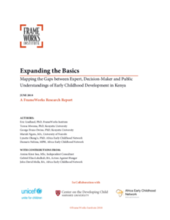This report is a first step in a larger collaboration between the FrameWorks Institute, UNICEF, the Harvard Center on the Developing Child and the Africa Early Childhood Network, with funding from the Conrad N. Hilton Foundation. The collaboration aims to develop communications strategies and tools that can translate the neuroscience of early childhood development (ECD). The immediate goal is to help members of the public and those who work and make decisions in the ECD sector – first in Kenya and eventually in East Africa more broadly – better understand the importance of children’s early brain development and the kinds of inputs and practices that best support it. Towards that end, the collaboration seeks to develop an evidence-based narrative that engages people in the value of building and sustaining programmes and systems that support caregivers, families and communities in the service of children’s healthy brain development. In the process, the larger goal of the project is to contribute to national and regional efforts to improve outcomes for children.
The first phase of the project involves three intersecting tracks of research. The first identifies a shared science account – what FrameWorks calls an ‘untranslated expert story’ – of the neuroscience of children’s early development. This story includes explanations of how brain development happens in early childhood and why it is so important to the developmental process. The second track identifies the cultural models – implicit, shared understandings, assumptions and patterns of reasoning – that members of the Kenyan public use to reason about early childhood, the developmental process, early learning, attributions of responsibility, challenges, solutions and a range of other topics pertaining to early development. The third track explores how people who work and make decisions in the ECD sector in Kenya – hereafter called ‘ECD decision-makers’ – think about and understand these same topics. Bringing these three research tracks together, this report considers a set of key overlaps and gaps in understanding and perception among these populations. This foundational descriptive work of mapping the cultural and cognitive landscape on ECD in Kenya sets up a subsequent prescriptive research phase for the project. This phase will develop and test a set of communications tools and strategies directed at making the science and neuroscience of early development more accessible to both public and decision-maker thinking.

